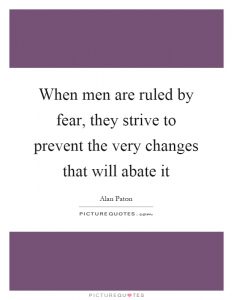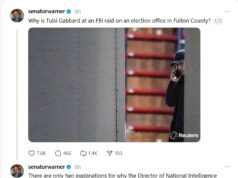This piece is appearing this weekend in newspapers in my very red congressional district (VA-06).
*****************************
How one regards the future presents a clear window into one’s soul:
How well do we love our children? What values do we want to see realized in the world? Are we driven by fear or by hope?
So we can judge — from how the Republican Party deals with the future — the state of that Party’s soul.
Here’s the first clue about the Republicans’ relationship with the future: It has been years since the Republicans presented any picture of a better America in the future to which they want to lead us.
What does it mean that either they have no such vision of a better future or they just don’t feel motivated to work to achieve it? Earlier generations of Americans took pride in moving this nation forward. What has happened to this generation of Republicans?
(And why don’t the people in the Republican base mind that their Party doesn’t even speak about a path to a better future for our children and grandchildren?)
All the religious traditions tell us to strive toward achieving the ideal. (E.g. “Love thy neighbor as thyself” points toward a Christian ideal of a community ruled by love.) Have these Republicans no ideal of how things should be in America?
Or, perhaps, is there some moral and emotional failure to care about the future?
Not long ago, President Trump’s public lawyer, Rudy Giuliani – a fitting representative of today’s Republican Party – gave a striking rendition of the “I don’t care” spirit.
Giuliani was asked whether he was concerned that his antics as Trump’s often irresponsible legal attack dog on TV might be hurting his legacy. Giuliani replied without hesitation: “I don’t care about my legacy. I’ll be dead.”
What does Giuliani’s declaration that he doesn’t care about what people think about him after he’s dead tell us about his relationship with the future?
It likely means that he doesn’t feel connected with those people of the future in any morally and spiritually important relationship. Which likely means he doesn’t care about them—or their well-being.
Once we have people in power who don’t care about what kind of lives the people of the future will experience, then all sorts of terrible things become possible.
Just how ugly in terms of real-world consequences that Republican “I’ll be dead” mentality can be is quite well demonstrated by the Republicans’ way of dealing with the epochal challenge of climate change.
On the issue of climate change, the Republican Party – the only political party among advanced democracies to deny climate science — is the political hireling of the fossil fuel industry. Together, that industry and that political Party have worked to put the industry’s present profit ahead of the future for our children and grandchildren.
The failure to care about the well-being of those to come after us bespeaks a flagrant violation of the Golden Rule of Christianity, which says: “Do unto others as you would have them do unto you.” Among those “others,” whom Christ said we should treat as if we were in their position, are the people of the future who are so dependent upon us to do right unto them.
So the Republican Party’s sacrificing the people of the future in service of the fossil fuel industry runs counter to the central moral principle of Christianity.
(Does the Republican base likewise not care enough about those to come to make sure we safeguard their future?)
Another glimpse into the Republicans’ relation to the future concerns that quite basic spiritual choice: the choice between hope and fear.
Here, too, the Republicans’ choice shows a relationship with the future that reflects the Republican Party’s brokenness of soul.
It is clear that our religious traditions reject the choice of fear. “Be not afraid,” the Bible says again and again. And it is not hard to see why a religious voice that’s concerned with the Good would want people to act in the world on the basis of hope.
Fear involves envisioning a potential bad future. It is defensive, and it creates a frame of mind in which trust and cooperation become more difficult, and conflict more likely.
Cultivating fear is a dark art, because it feeds brokenness.
Hope is about envisioning things taking a good course as time unfolds, envisioning a path along which things get better. It is about reaching toward wholeness, and being open to working with others to move the world toward the best possibilities. The spirit of hope fosters an increase in cooperation and a decrease in conflict.
So that is the moral context in which to read the way the Republicans have for years cultivated not the hopes but consistently the fears of their supporters.
Trump is, of course, blatant in his continual sowing of fear—like a false immigration crisis, like “American carnage,” like calling the Caravan an “invasion” peopled by criminals and terrorists, like Mexicans sending us “rapists,” like calling for the exclusion of Muslims. All those examples, and so many others.
(And before Trump, there was George W. Bush and his “war on terror,” when he continually brought the image of terrorism before the people’s eyes, even though there was nothing useful to be accomplished. “Be afraid,” was the continual message, because it was useful for their political purposes. Branding oneself as the necessary protector, and the Democrats as “soft on terror,” was the main fear-based strategy that Bush employed, turning 9-11 into a weapon to extend his power.)
Wherever we look at how the Republican Party of these times relates to the future, we see a soul that has gone over to the side of the dark and the broken.
***************
Andy Schmookler is the author most recently of A Better Human Story.



![[UPDATED 1/29/26] Audio: Sen. Tim Kaine Talks to Blue Virginia About His “Five-Point Plan” to Fight Trump’s Orban-Like Assault on US Democracy; Civil Disobedience a la MLK Jr.; Trump’s Bogus “Energy Emergency”; the Crucial Importance of the 2025 VA Elections; etc.](https://bluevirginia.us/wp-content/uploads/2025/02/kaineinterview2-238x178.jpg)







![[UPDATED 1/29/26] Audio: Sen. Tim Kaine Talks to Blue Virginia About His “Five-Point Plan” to Fight Trump’s Orban-Like Assault on US Democracy; Civil Disobedience a la MLK Jr.; Trump’s Bogus “Energy Emergency”; the Crucial Importance of the 2025 VA Elections; etc.](https://bluevirginia.us/wp-content/uploads/2025/02/kaineinterview2-100x75.jpg)
